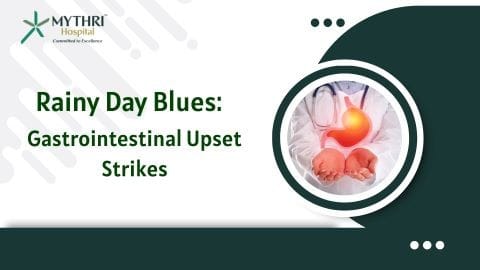When the skies open up and the rain begins, many of us pull out umbrellas and cozy blankets—but for others, rainy weather can bring unwelcome stomach woes. Digestive discomfort such as stomach cramps, diarrhea, acid reflux, and gastric infections often spike during monsoon months. Understanding why and knowing when to seek expert care is critical—and that’s where Mythri Hospital’s Gastroenterology Department steps in.
Why rainy days develop digestive disorders?

1. Contamination of water and bacterial infection
Monsoon floods and water run-off can contaminate drinking water with parasites, viruses, and bacteria. This is most probably going to cause gastrointestinal illnesses in the form of acute gastroenteritis, salmonella, E. coli infections, etc.
2. Degradation of food in waterlogged environment
Hot and humid weather conditions during rainy periods may cause speedy food spoilage. Home foods and street foods handled unsafely may carry food poisoning or gastrointestinal infection-causing agents.
3. Stress and routine disruption
Rain disrupts daily schedules—less outdoor time, altered mealtimes, cravings for comfort foods—possibly resulting in acid reflux, indigestion, and irritable bowel syndrome (IBS) exacerbation of IBD.
Prevalent rainy‑day gastrointestinal conditions

1. Acute gastroenteritis
Often referred to as “stomach flu,” it is characterized by diarrhea, vomiting, cramps, and dehydration. Most often caused by viruses (norovirus, rotavirus) or bacteria in contaminated food and water.
2. Foodborne disease
– Food poisoning due to Salmonella and E. coli is caused by symptoms like such severe cramps, fever, diarrhea, and vomiting.
– Listeria is risky for pregnant women and the older generation.
3. Peptic ulcer aggravations
Stress, indulgences in eating, and greater consumption of pain killers such as NSAIDs during rainy misery may lead to worsening of already developed ulcers, precipitating ulcers symptom—pain, indigestion, and bleeding.
4. Acid reflux / GERD flares
Overeating heavy, spicy, and fried comfort foods on rainy days and resting within a short time after meals can provoke acid reflux and heartburn.
5. IBS and functional GI disorders
Weather fluctuations, irregular meal times, and tension can aggravate IBS symptoms of bowel habit change, cramps, and bloating.
Early treatment promotes rapid recovery—don’t let mild discomfort turn into something serious.
Digestive Upset on Rainy Days: Caring for Yourself

Home Remedies (Mild Symptoms)
- Hydration: Consume safe, boiled water with ORS, coconut water, herbal teas.
- Bland BRAT Diet: Bananas, Rice, Applesauce, Toast—the gut-friendly foods.
- Ginger & Mint: Ease nausea and gas with warm ginger-mint tea.
- Probiotics: Yogurt or supplements to restore gut flora.
- Rest & Routine: Have smaller meals, stop eating greasy foods, and take it easy
- Coconut water for IBD.
Over-the-counter options
– Heartburn relief antacids
– Mild anti-diarrheal medicine for a minor bout of diarrhea
– Low-strength pain-relief (e.g., paracetamol) for cramping
Warning: Do not use NSAIDs such as ibuprofen without consulting your physician—these exacerbate ulcers or bleeding in the stomach and Symptoms of IMD, AKL in CLD.
When to see a gastroenterologist?

See a specialist if you experience:
- Frequent or bloody diarrhea
- High-grade fever
- Severe or ongoing belly pain
- Signs of dehydration
- Loss of appetite or unexplained weight loss
- Persistent heartburn or acid reflux in spite of OTC drugs
A gastroenterologist such as those at Mythri Hospital provides diagnosis, treatment, and long-term relief.
Mythri hospital advanced diagnostic evaluation

Mythri Hospital Gastroenterology Department is best equipped for comprehensive evaluation:
Endoscopy & Colonoscopy
– Upper endoscopy for acid reflux, ulcers, GI Bleed, Unintentional weight loss, difficulty in swallowing , IBD, Chronic Abdominal pain.
– Colonoscopy for chronic diarrhea, bleeding, diagnosis of IBS
Ultrasound & Imaging
– Accurately detect gallstones, pancreas and liver inflammation.
Lab & Stool Analysis
– Detect bacterial, viral, parasitic infection, malabsorption syndromes.
pH Monitoring & Manometry
– Examine severity of acid reflux and swallowing disease.
Expert analysis is supported by experienced gastroenterologists with working collaborations involving radiologists, pathologists, and dietitians.
Treatment Approaches & Follow-Up
Individualized Therapy
- Bacterial infection (e.g., salmonella) treatment using antibiotics
- Medication to reduce acid (PPIs/H2 blockers) for reflux/ulcers
- Antispasmodics or IBS medications for functional disorders
Nutritional Counseling
Customized diet plans are given to each patient—low-spice, low-fat for stabilizing gut health.
Preventive Care
Tips on drinking water and food safety during monsoons
Lifestyle advice: stress management, quit smoking, moderate alcohol
Follow-up & Monitoring
Follow-up regularly is what ensures healing, relief of symptoms, and reduced flare-ups.
Mythri hospital: your healthcare partner in gastroenterology

Mythri Hospital differentiates itself with an emphasis on comprehensive digestive care, particularly during the monsoon period. This is how we help:
- Rapid intervention for sudden onset of GI symptoms like gastroenteritis, food poisoning, fever, cramps.
- A 24/7, around-the-clock Gastroenterology Unit with veteran GI physicians and nurses.
- State-of-the-art endoscopic, imaging, and laboratory facilities in the building to make quick diagnoses and treatments.
- Multidisciplinary care: gastroenterologists, dietitians, radiologists, psychosocial counselors all coordinated to heal you.
- Preventive care special programs to keep you symptom-free through food-safety education and lifestyle modification.
- A patient-first approach: low-cost care, zero waiting time, strict follow-up—every detail with your comfort and healing process considered.
Remedies to Keep Your Digestive System Fit This Monsoon
- Safe Drinking Water: Purify or boil
- Fresh & Cooked: Don’t eat stale food; reheat well
- Balanced Meal: Keep an eye on fruits, vegetables, whole grains
- Hygiene First: Wash your hands before eating—skip pathogens
- Avoid Triggers: Cut down on caffeine, fried/spicy food, heavy meals, Alcohol, smoking, tea, chocolates, sweets, citrus food and processed foods.
- Stay Active & Manage Stress: Even home habits aid circulation and digestion
Your way to rainy-day relief
Monsoon digestive disturbances are unavoidable, yes, but not incurable and untreatable. Beginning with home treatments and over-the-counter drugs may stem minor attacks—but on aggravation or continuance of symptoms, professional assistance is required.
At Mythri Hospital, we hold to elaborate, patient-focused gastroenterology. From quick diagnosis to long-term management, our specialists do everything possible to disburden your pain and avoid subsequent episodes—particularly of weather conditions.
Conclusion

Don’t let the monsoon rains upset your tummy. When during monsoon symptoms like diarrhea, vomiting, reflux, or cramps hit, proactiveness is the key. Adopt safe food habits, bowel hygiene, and seek experts like Mythri Hospital when required. Our state-of-the-art gastroenterology services are here to sail you smoothly through monsoon seasons—and beyond—confidently, safely, and healthily.


